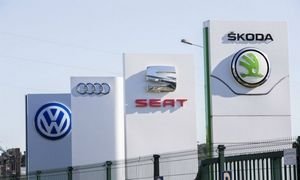Germany Will Retest VW Cars as Scandal Pushes Berlin to Act

Expressing his "irritation" with VW, German Transport Minister Alexander Dobrindt said on Wednesday that all current models sold under the VW, Audi, Skoda and Seat brands - with both diesel and gasoline engines - would be tested for CO2 and NOx emissions.
Previously the government had said it would review only NOx emissions from VW diesel cars.
The German government's announcement followed a VW statement on Tuesday that it had understated the level of CO2 emissions in about 800,000 cars sold mainly in Europe, and consequently their fuel usage. This means affected vehicles are more expensive to drive than their buyers had been led to believe.
Dobrindt said 200,000 of the 800,000 vehicles with false CO2 and consumption values are on the road in Germany.
He said the government wanted to force VW to pay the extra car taxes which would be incurred by the higher CO2 emissions levels, but said he could not give an estimate of the size of the possible adjustment to the tax.
The revelations added a new dimension to a crisis that had previously focused on how Europe's biggest carmaker cheated in U.S. tests on diesel cars for emissions of NOx, which cause smog.
U.S. sales stop
As the crisis deepened, VW said it had told U.S. and Canadian dealers to stop selling recent models equipped with its 3.0-liter V6 TDI diesel engine, while the Moody's agency downgraded the firm's credit rating.
VW employs over 750,000 people in Germany and has been a symbol of the nation's engineering prowess. Dobrindt said the automaker had caused "irritation in my ministry and with me," while Chancellor Angela Merkel's spokesman said it had to take steps to prevent such a case happening again, adding: "VW has a duty to clear this up transparently and comprehensively."
The admission about fuel consumption threatens could make a serious dent in VW's sales since it could deter cost-conscious consumers, analysts said.
Tuesday's revelations, which led to Volkswagen adding 2 billion euros ($2.2 billion) to its expected costs from the scandal, are also the first time gasoline cars have been drawn into the crisis.
VW said most of the 800,000 cars affected had diesel engines such as VW's top-selling Golf, Audi's A3 hatchback and the Skoda Octavia but two models were gasoline: the VW Polo and the Audi A1, both with a 1.4-liter engine and cylinder cut-off.
Moody's said it had downgraded Volkswagen's credit rating to A3/P-2 with a negative outlook due to this revelation. "These new claims pose further challenges to Volkswagen's financial flexibility and competitive position, and heighten Moody's concerns about Volkswagen's internal control and governance issues, thus further weakening its rating profile," said Yasmina Serghini, Moody's lead analyst for VW.
Shares in Volkswagen closed down 9.5 percent on Wednesday, wiping more than another 3 billion euros ($3.3 billion) off its market value. It has lost almost a third of its value or 24 billion euros since the scandal broke.
'Beyond a joke'
Ernst-Robert Nouvertne, who runs two Volkswagen dealerships near Cologne with VW, Audi and Skoda models, said the situation was getting "beyond a joke."
"As bad as it is, the emissions issue alone would be manageable but this [CO2 admissions] is adding a new dimension to our troubles. I hope we will get through this at some point," he said. "People have already started to rail against VW. If they start railing about our product we have a problem."
The VW scandal erupted on Sept. 18 when U.S. authorities exposed VW's use of "defeat devices" to cheat tests for emissions of NOx. VW admitted such software was installed in up to 11 million diesel vehicles worldwide.
VW's "stop-sale" order in the United States and Canada followed a notice by the U.S. Environmental Protection Agency that VW group brands had installed illegal devices on some 3.0-liter V6 diesel models including Audi vehicles and the Porsche Cayenne.
VW has denied that but Mary Nichols, chair of the California Air Resources Board in Los Angeles, told Reuters that regulators repeatedly saw the engines cycle through tests with a relatively low amount of emissions, only to see an increase in pollution a couple of seconds later.
"It's almost impossible to explain something like that in any way other than something about the software that controls the operation," Nichols said, noting that Volkswagen had tried to argue that the phenomenon was part of an effort to "warm up the system."
"In all honesty that explanation doesn't make any sense," she said.
German lawyer Andreas Tilp, who filed legal action against VW last month on behalf of a private investor in the firm, said the CO2 admission gave the case "extra ammunition."
"With every widening of the scandal, the likelihood grows that a large number of people at VW had knowledge," he said.
The effects of the scandal have so far barely been reflected in VW sales figures - although it was the only German carmaker to report a decline in car registrations in Germany in October.
Related News
